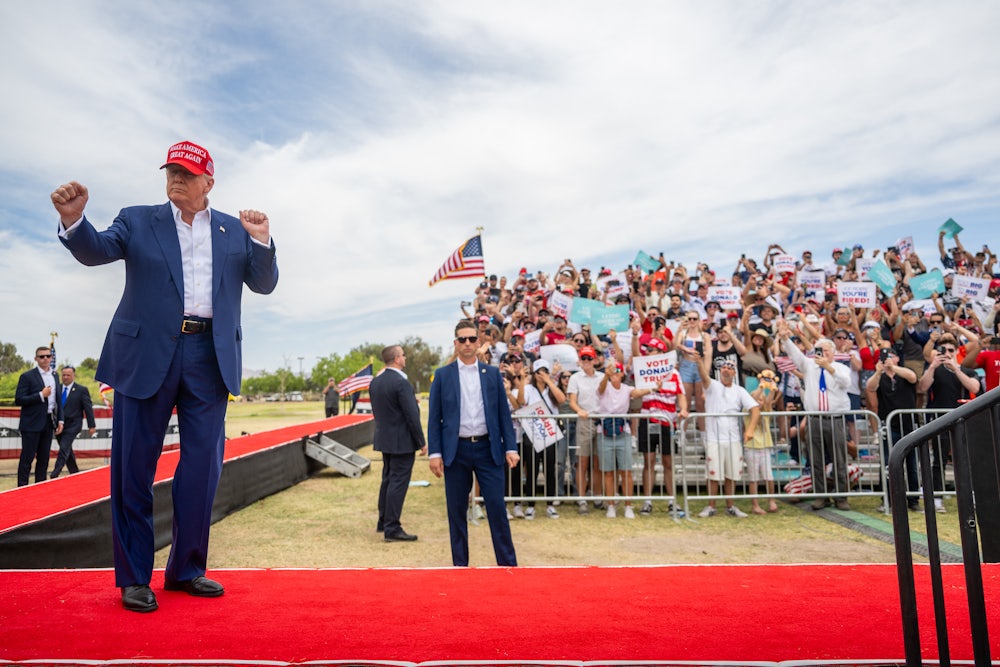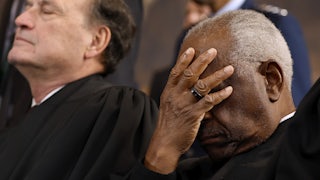A central puzzle of American politics is how Donald Trump can command a working-class majority in the polls when his past policies on everything from taxation to workplace safety to labor rights run counter to working-class interests—even as Trump’s opponent, President Joe Biden, authentically champions the working class. Trump achieves this by identifying government as the class enemy. Trump’s new promise not to tax workers’ tips is a case in point.
Campaigning in Las Vegas on Sunday, Trump said: “For those hotel workers and people that get tips, you’re going to be very happy, because when I get to office, we are going to not charge taxes on tips.” The crowd cheered.
The main purpose of this announcement was to divert attention from Trump’s earlier promise that, if elected, he’ll extend the tax cuts he enacted in the first year of his presidency, which are due to expire at the end of 2025. These were a gift to the rich. According to the nonprofit Center on Budget and Policy Priorities, the 2017 tax cuts delivered three times as much, as a share of after-tax income, to people in the top 5 percent of the income distribution as they did to people in the bottom 60 percent. Biden has pledged to maintain the Trump tax cuts for anybody earning $400,000 or less but to eliminate them for anybody earning more than that (i.e., the top 5 percent).
If you want the top 5 percent to pay more in taxes, vote for Biden. If you want the top 5 percent to pay less in taxes, vote for Trump.
Trump wouldn’t likely stop at preserving existing tax giveaways to the rich. The Washington Post’s Jacob Bogage reported Sunday that congressional Republicans want to lower the maximum corporate tax rate—which Trump reduced in 2017 from 35 percent to 21 percent—even further, to 15 percent or so. Biden wants to increase the top corporate tax rate to 28 percent. “Mandate for Leadership,” the Heritage Foundation policy text that’s widely judged a proxy for Trump’s policy agenda (since his campaign doesn’t have one), proposes lowering the top marginal capital gains rate from the current 23.8 percent to 15 percent. Biden would raise it to 39.6 percent, same as his proposed top marginal income tax rate, based on the sound theory that capital and labor should be taxed the same. That’s how it used to be under those famously Bolshevik Presidents Ronald Reagan and George H.W. Bush.
If you want taxes on corporations and on investments to be higher, vote for Biden. If you want them to be lower, vote for Trump.
Trump’s tax policies won’t play well with working-class voters if they ever get around to comparing them to Biden’s. Hence Trump’s promise to eliminate taxes on tips. If you’re inclined, as many working-class voters are, to regard the federal government with contempt, eliminating the taxation of tips might sound pretty good. But the idea doesn’t hold up to scrutiny.
If we’re talking about cash tips—granted, a small player these days in the tip economy (by one calculation, only 5 percent), but still the principal source of big tips—let’s get real. With the exception of very low-wage employees, nobody pays taxes on cash tips. The Internal Revenue Service says you have to report any tip over $20, but the IRS has no way to track cash tips, and everybody knows that. For any service worker not earning a poverty wage, Trump promising not to tax cash tips is like Trump promising to make the sun rise every morning in the east.
It’s different for the lowest-paid service workers because they are paid something called the “tipped minimum wage.” The federal hourly minimum wage, unchanged for 15 years, is $7.25, which is measly enough, but employers may pay tipped workers an even measlier $2.13 provided tips bring their income up to the hourly minimum. When cash tips predominated, these workers were perhaps tempted to underreport tips to the boss, thereby compelling him to make up the difference. But these days (especially in fast-food restaurants, which is where most restaurant servers work), electronic tip screens predominate, allowing your boss and the IRS to keep careful track of tips.
Let’s say you’re a restaurant server being paid the federal subminimum wage of $2.25 per hour. If you work full-time, you pull down $4,680 per year in wages and (assuming your tips really do bring you up to the federal minimum) $10,400 in tips, for a total income of $15,080. Under Trump’s plan, you will no longer have to pay income tax on two-thirds of that income. Sounds pretty good, right?
Except you’re barely paying income tax now. If you’re single and your income is below $12,950, the IRS doesn’t require you to file. If you’re single and a head of household and your income is below $19,400, the IRS doesn’t require you to file. You do have to pay payroll tax, but Trump didn’t say anything about eliminating payroll taxes on tipped income. That would be much more complicated and difficult.
Earning $10,400 in reported tips, incidentally, would appear to be pretty unusual. The average tipped worker reported only $6,249 in tips as of 2018, the last year for which data are available. Maybe it’s because tipped workers experience considerable difficulty finding full-time work. Maybe employers are cheating tipped workers. Maybe tipped workers are underreporting tips to the IRS. Maybe it’s some combination of all three. Whatever the reason, the benefit of Trump’s tax holiday is even smaller than I calculated in the previous paragraph.
Employers love the tipped minimum because it allows them to shift their labor costs onto customers (who are getting pretty fed up with the burgeoning tipping economy). By making employees’ livelihood dependent on tips, the subminimum wage compels service workers to bow and scrape merely to get paid what federal law requires. A better solution would be to eliminate the tipped minimum wage entirely. That’s what Biden has imposed on federal contractors (for whom the federal minimum is $15 per hour). This solution was also part of the Democrats’ failed effort in 2021 to raise the hourly federal minimum (again, to $15).
Service workers in Nevada who cheered Trump’s proposal to eliminate taxes on tips should remember that Trump at one point in 2016 proposed not raising the federal hourly wage minimum, but eliminating it altogether. He later came out for a $10 minimum, but only to mollify angry voters; as president he never lifted a finger to raise the minimum wage. It’s telling that when Trump finally gets around to proposing a tax policy that might have some appeal for working-class voters, he does so not by requiring employers to pay workers a living wage but rather by requiring the federal government to take up the slack. God forbid that a Republican candidate should ever ask American business to pay for anything.


